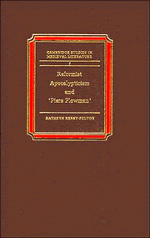Book contents
- Frontmatter
- Contents
- Acknowledgments
- List of abbreviations
- 1 Introduction
- 2 The visionary prophecy of Hildegard of Bingen in relation to Piers Plowman
- 3 Piers Plowman and the medieval visionary tradition
- 4 Leaven of malice: false apostles in the anti-mendicant apocalypticism of later medieval England
- 5 Leaven of hope: new leadership and Joachite apocalypticism
- 6 Conclusions
- Notes
- Select bibliography
- General index
- Index of biblical citations
- Index of manuscripts
6 - Conclusions
Published online by Cambridge University Press: 15 October 2009
- Frontmatter
- Contents
- Acknowledgments
- List of abbreviations
- 1 Introduction
- 2 The visionary prophecy of Hildegard of Bingen in relation to Piers Plowman
- 3 Piers Plowman and the medieval visionary tradition
- 4 Leaven of malice: false apostles in the anti-mendicant apocalypticism of later medieval England
- 5 Leaven of hope: new leadership and Joachite apocalypticism
- 6 Conclusions
- Notes
- Select bibliography
- General index
- Index of biblical citations
- Index of manuscripts
Summary
This study has attempted to consider the extent to which Langland may be seen to reflect attitudes typical of what Robert Lerner has recently called the medieval European apocalyptic mentality (Lerner, “Black Death”). We have looked at some of the works which reflect this mentality and which were available in fourteenthcentury England in our study of the Hildegardian visionary tradition, the eschatological propaganda of the anti-mendicant writers and the non-visionary prophetic tradition of the Joachite thinkers. When supplemented by some knowledge of the formal and stylistic features of the early apocalypses of the Christian tradition, this body of material can begin to provide answers to some questions which have troubled critics of Piers Plowman for years. Whether it be the problem of Langland's “non-medieval” allegorical style or his troublesome beginning of a new pilgrimage after the coming of Antichrist or his seemingly odd obsession with the reform of the fraternal orders, an awareness of medieval religious apocalypticism has helped to illuminate some of the poem's supposed idiosyncrasies. This should suggest to us that it is not Langland who is “nonmedieval” or idiosyncratic in his symbolism or inconsistent in his allegory, as so many critics have charged – it is we who do not know enough about the conventions and models he was working with. Some day, I hope that we will know much more than we do now about the reformist apocalypticism which lies behind the poem. Scholarship could further illuminate every facet of apocalypticism touched on here. With so many questions still unanswered, one can only hope that it does.
It should be apparent by now that reformist apocalypticism, as I have described it, is motivated by the dual concerns of a felt need for social and spiritual renewal.
- Type
- Chapter
- Information
- Reformist Apocalypticism and Piers Plowman , pp. 201 - 203Publisher: Cambridge University PressPrint publication year: 1990



